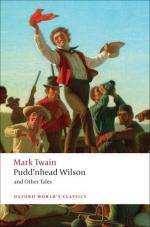The Jew is begin legislated out of Russia. The reason is not concealed. The movement was instituted because the Christian peasant and villager stood no chance against his commercial abilities. He was always ready to lend money on a crop, and sell vodka and other necessities of life on credit while the crop was growing. When settlement day came he owned the crop; and next year or year after he owned the farm, like Joseph.
In the dull and ignorant English of John’s time everybody got into debt to the Jew. He gathered all lucrative enterprises into his hands; he was the king of commerce; he was ready to be helpful in all profitable ways; he even financed crusades for the rescue of the Sepulchre. To wipe out his account with the nation and restore business to its natural and incompetent channels he had to be banished the realm.
For the like reasons Spain had to banish him four hundred years ago, and Austria about a couple of centuries later.
In all the ages Christian Europe has been oblige to curtail his activities. If he entered upon a mechanical trade, the Christian had to retire from it. If he set up as a doctor, he was the best one, and he took the business. If he exploited agriculture, the other farmers had to get at something else. Since there was no way to successfully compete with him in any vocation, the law had to step in and save the Christian from the poor-house. Trade after trade was taken away from the Jew by statute till practically none was left. He was forbidden to engage in agriculture; he was forbidden to practise law; he was forbidden to practise medicine, except among Jews; he was forbidden the handicrafts. Even the seats of learning and the schools of science had to be closed against this tremendous antagonist. Still, almost bereft of employments, he found ways to make money, even ways to get rich. Also ways to invest his takings well, for usury was not denied him. In the hard conditions suggested, the Jew without brains could not survive, and the Jew with brains had to keep them in good training and well sharpened up, or starve. Ages of restriction to the one tool which the law was not able to take from him—his brain—have made that tool singularly competent; ages of compulsory disuse of his hands have atrophied them, and he never uses them now. This history has a very, very commercial look, a most sordid and practical commercial look, the business aspect of a Chinese cheap-labour crusade. Religious prejudices may account for one part of it, but not for the other nine.
Protestants have persecuted Catholics, but they did not take their livelihoods away from them. The Catholics have persecuted the Protestants with bloody and awful bitterness, but they never closed agriculture and the handicrafts against them. Why was that? That has the candid look of genuine religious persecution, not a trade-union boycott in a religious dispute.




